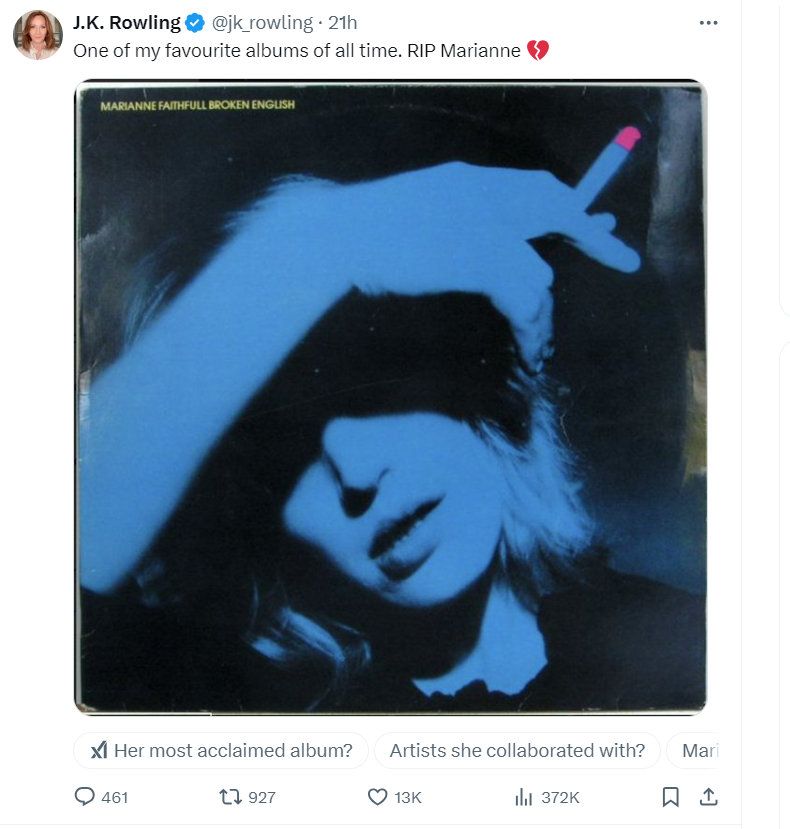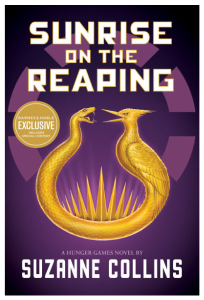
 Marinanne Faithfull, English pop icon with a history eerily reminiscent of Leda Strike’s, died yesterday, age 78. J. K. Rowling promptly tweeted the message above and retweeted a similar note from the Rolling Stones. Three quick notes:
Marinanne Faithfull, English pop icon with a history eerily reminiscent of Leda Strike’s, died yesterday, age 78. J. K. Rowling promptly tweeted the message above and retweeted a similar note from the Rolling Stones. Three quick notes:
(1) Broken English Rowling Readers learned in Troubled Blood about the author’s admiration for Joni Mitchell and especially her Court and Spark album. Mitchell, a later in life discovery for Mrs Murray, joined the short list of popular music groups that we knew were Rowling favorites from her youth (e.g., The Smiths, Siouxsie and the Banshees). Until today, I don’t think she’s mentioned Marianne Faithfull or this “all time” “favorite album,” Broken English. If, like me, this album was new to you, here is the title track and the controversial ‘Why D’ya Do It?’ from that disc:
Rowling was not alone in loving Broken English, Faithfull’s comeback album and consensus “masterpiece.” From the Wikipedia article about it:
Broken English received critical acclaim. It peaked at number 82 on the Billboard 200, becoming her first album to chart in the United States since Go Away from My World (1965) and giving Faithfull a first nomination for the Grammy Award for Best Female Rock Vocal Performance. It reached number 57 in the United Kingdom and entered the top five in Germany, France and New Zealand. Broken English was certified platinum in Germany and France, and sold over one million copies worldwide. Two singles were released from the album, with “The Ballad of Lucy Jordan” peaking at number 48 on the UK Singles Chart. The album was included on NME magazine’s list of “500 Greatest Albums of All Time” and in the book 1001 Albums You Must Hear Before You Die…. In 1981, Faithfull was nominated for the Grammy Award for Best Female Rock Vocal Performance for this album.
Released in late 1979, if we take Rowling’s broken heart emoji on today’s tweet seriously, she was listening to Broken English at the critical time of her adolescence in Tutshill through at least her days at the University of Exeter. This ‘find’ is not going to displace Austen, Shakespeare, or even Wodehouse on the list of Rowling’s greatest literary influences, but I wonder if it might rank with her recently discovered favorite, John Keats? Serious Readers of Rowling, especially those who track her signature intertextuality, are obliged, I think, to give this album, perhaps all of Faithfull’s work, a close listen.
(2) The Life of Marianne Faithfull
Broken English, as mentioned, was a “comeback” effort for the artist, whose life had fallen to the depths. Again, via Wikipedia:
Broken English was Faithfull’s first major release since her album Love in a Mist (1967). After ending her relationship with Mick Jagger in 1970 and losing custody of her son, Faithfull suffered from heroin addiction and lived on the streets of London. Severe laryngitis and drug abuse during this period permanently altered Faithfull’s voice, leaving it cracked and lower in pitch. She attempted a comeback in 1976 with Dreamin’ My Dreams, which achieved only minor success. Shortly afterwards, Faithfull began working with musician Barry Reynolds, who produced the songs “Broken English” and “Why D’Ya Do It?”. The demos attracted the attention of Chris Blackwell who signed Faithfull to his record label Island Records.
How low had she fallen?
Faithfull ended her relationship with Jagger in May 1970 after she started an affair with Anglo-Irish nobleman “Paddy” Rossmore. She also lost custody of her son in that same year, which led to her attempting suicide. Faithfull’s personal life went into decline, and her career went into a tailspin. She made only a few appearances, including an October 1973 performance with David Bowie, singing Sonny & Cher’s “I Got You Babe”.
Faithfull lived on London’s Soho streets for two years, suffering from heroin addiction and anorexia nervosa. Friends intervened and enrolled her in an NHSheroin-assisted treatment programme. She failed at controlling or stabilising her addiction at this time. In 1971, producer Mike Leander found her on the streets and made an attempt to revive her career, producing part of her album Rich Kid Blues. The album was shelved until 1985….Faithfull squatted in a Chelsea flat without hot water or electricity with then-boyfriend Ben Brierly of the band the Vibrators.
Faithfull had three miscarriages and four abortions. The first abortion was in 1965, when she had become pregnant by Gene Pitney; the procedure was still illegal in the United Kingdom at the time and Faithfull stated that she had a hard time dealing with the guilt. She began to feel better once her son was born the year after. Subsequent terminations were from her period of drug abuse as she did not wish for the children to be born as addicts
She not only survived these depths, she became something of a legend, both as lyricist, performer, and writer (her several straight-from-the-hip memoirs were all best sellers). Faithfull’s remarkable and forceful personality, evident in this 2018 Guardian profile, ‘Marianne Faithfull: “This is the most honest record I’ve made. It’s open-heart surgery, darling”,’ reminded me repeatedly of Rowling; I thought more than once, “This might be what Rowling sounds like at age 80.”
“It’s literally a pain to fucking do anything,” she says, settling in her seat with Miriam’s help. She’s brought a fan, plus a plate of mango, cut into tiny pieces, which she lifts to her mouth to reach the final bits (“excuse me for being disgusting”). She then smokes a cigarette slowly: she started again a few years ago. “It’s the last thing I do. I don’t even drink coffee any more!” She sighs, theatrically. “Everything fucking hurts. But you try and fucking stop me.”…
What does she think of similar revelations after the #MeToo campaign? Her response is odd: “I couldn’t give a flying fuck.” Really? “No.” But when other women are honest, like you were, are you glad? “Yeah, I’m very glad. Proud. About fucking time! Women spend their lives just trying to please men.” Isn’t that you endorsing what they’re doing? She shrugs, still smiling. “Whatever!”
Instead, Faithfull tells me about her Austrian mother, Eva von Sacher-Masoch, and Jewish grandmother, Flora, who brought her up in an ordinary terraced house in Reading after her parents divorced. Her mother had been an actress and dancer before the second world war; she had lived with her mother in Vienna during it, being protected from the Nazis thanks to their aristocratic background. “But when the Russians entered Vienna, my mother and grandmother were raped, and after that my mother got pregnant and had an abortion. Then the next thing that happened – which always happens – is that she really wanted another baby. Then she met my father, and I think she thought that he would be a great father for a baby, and so she married him and they had me.”
They split up six years later. “It was probably all for the best,” Faithfull says, “and I would be a different person [if they’d stayed together]. I probably wouldn’t have hated men so much! But, you know, Mum needed me.” Faithfull adds that she did many similar things to her mum. She had an abortion early in 1965, after getting pregnant by Gene Pitney on a UK tour, then, in May, married her boyfriend of several years, Indica gallery owner John Dunbar, and had their son, Nicholas, in November. “It took me a long time to get away from that feeling I got from Mum, about men. Decades. But I don’t have it any more.”
She also got pregnant by Mick Jagger, for whom she left Dunbar in 1966, but lost the baby seven months into the pregnancy. Did that leave a lasting effect? “Yes, of course,” she says. “But please, it’s taken me years to separate myself from the Rolling Stones. I never talk about Mick any more, and I won’t talk about then.” There were two more marriages: to the Vibrators’ Ben Brierley in 1979, which lasted six years; and to writer Giorgio Della Terza in 1988, which lasted three. Then there was a 15-year relationship with French record producer Francois Ravard, who still manages her; they split in 2009, but remain good friends.
“My main priority in my head was always my work,” she continues, “but then, of course, the men came… and it wasn’t really what I wanted, but I was too pretty to be left alone.” She attempted suicide by drug overdose on a plane in 1969; she divorced and lost custody of her son a year later. By 1972, she was an anorexic heroin addict, living rough in London. “My answer to everything was to get as stoned as possible and live on the street, which made me sort of unattractive.” Making yourself unappealing liberated you? “Yeah!” Her smile broadens, as if this was the most wonderful revelation in the world.
Do read the whole thing. Faithfull was a remarkable artist and what used to be called a “vivid personality.”
If you heard of her in the United States, it was probably her 1964 recording of the Jagger-Richards song, ‘As Tears Go By:’
From The Guardian profile‘s notes on ‘As Tears Go By:’
Faithfull’s music is rarely discussed in any detail. Yes, she was originally signed because Rolling Stones manager Andrew Loog Oldham chanced upon her at a party, saying later he saw “an angel with big tits” with “a face that could sell”. No, she doesn’t have a voice to match that soft-focus face, and she never really did. Even the first song she sang, Mick Jagger and Keith Richards’s As Tears Go By, is stripped of any sentiment by her deadpan delivery. She was 17, sounding like Nico before Nico. (She sings it again on Negative Capability, forcefully, reclaiming it.)
(3) The Leda Strike Parallels
I’ve written before about the many striking parallels between Jonny Rokeby, Cormoran Strike’s supposed biological father, and Mick Jagger of the Rolling Stones. See ‘Rokeby, Jagger, and Heroin’ for the full review. After comparing the ‘Personal Life’ Wikipedia pages of Jagger and the one written about Rokeby in Cuckoo’s Calling, the list of life-correspondences is, well, striking. The fictional character and real-life analogue are both:
- English War babies
- Lead singers of rock bands
- Drug Bust on 70’s Tour
- Relationships with super models
- One child, a daughter, with first wife
- Not the greatest of dad’s with child support to illigitimate children ($17 a week?)
- One model has illegitimate child causing divorce
- Model girlfriend commits suicide with drugs
- Gazillionaire, an Industry
- Children ‘Using Name’
Today we learned that Rowling has been a big fan of Marianne Faithfull, whose life not only parallels the author’s own in interesting ways (the “comeback” from near destitution as a single mother?), but seems a template for Leda Strike. Her dependence on and forever being linked to Rokeby as Faithfull was to Jagger and the descent into ‘living rough’ or in squalid squats after their break-up, not to mention the heroin connection and the smoking, all call the Broken English vocalist and composer to mind. From the Wikipedia life of Faithfull:
She began a much-publicised relationship with Mick Jagger [in 1966] and left her husband to live with him. The couple became a notorious part of the hip Swinging London scene. She is heard on The Beatles’ song “Yellow Submarine”.She was found wearing only a fur rug by police executing a drug search at Redlands, Keith Richards’s house in West Wittering, Sussex. In an interview 27 years later with A.M. Homes for Details, Faithfull discussed her wilder days and admitted that the drug bust fur rug incident had ravaged her personal life: “It destroyed me. To be a male drug addict and to act like that is always enhancing and glamorising. A woman in that situation becomes a slut and a bad mother.” It was during this time that Faithfull lost three opportunities to appear in films. “I really thought I had blown my career.” In 1968, Faithfull, by now addicted to cocaine, gave birth to a stillborn daughter (whom she had named Corrina) while returning from Jagger’s country house in Ireland.
Faithfull’s involvement in Jagger’s life was reflected in some of the Rolling Stones’s best known songs. “Sympathy for the Devil”, featured on the 1968 album Beggars Banquet, partially was inspired by The Master and Margarita, written by Mikhail Bulgakov, a book that Faithfull introduced to Jagger. The song “You Can’t Always Get What You Want” on the 1969 album Let It Bleed was supposedly written and composed about Faithfull; the songs “Wild Horses” and “I Got the Blues” on the 1971 album Sticky Fingers were allegedly influenced by Faithfull, and she co-wrote “Sister Morphine” (the writing credit for the song was the subject of a protracted legal battle that was resolved with Faithfull listed as co-author). In her autobiography, Faithfull said Jagger and Richards released it in their own names so that her agent did not collect all the royalties and proceeds from the song, especially as she was homeless and addicted to heroin at the time. In 1968, Faithfull appeared in The Rolling Stones Rock and Roll Circus concert, giving a solo performance of “Something Better”.
Of the police drugs raid of Keith Richards’s home, Redlands, in 1967, at which Faithfull emerged naked in a fur rug, she wrote: “They emerged with their reputations amplified as dangerous, glamorous outlaws… I was destroyed by the very things that enhanced them”; and of her first song, Sister Morphine: “I wasn’t going to be allowed to break out of my image… I would not be permitted to leave that tawdry doll behind.”…
Before I leave, she gets up slowly, another cigarette in her hand, and gives me a little tour of the flat, pointing out a beautiful nude and some landscapes by Anita Pallenberg (“people forget what brilliant talent she had”). A snap of Faithfull and Mick Jagger in the studio hangs in the loo (“best place for it!”). Half of her double bed is covered with books as is the rest of the house: she points out one she’s reading about John Lennon, and one about Shelley – her next project, also with Warren Ellis, is based on Prometheus Unbound. “I can’t say anything else!” she smiles, wickedly.
I have been speculating that the revelations of Hallmarked Man’s meeting between Rokeby and Strike will include the rock star’s confession that he loved Leda profoundly, that she broke his heart with “all her fucking men,” and that she contributed to The Deadbeats’ song catalogue — as I learned today Marianne Faithfull did the Rolling Stones.
I’ve pretty much given up my days of predicting plot points in the next Rowling-Galbraith effort, but, wow, have I felt a wave of that old feeling this morning. Especially as Rowling re-posted the ‘For Marianne’ tweet from the Rolling Stones; tell me she wasn’t actually throwing a little shade their way for Jagger’s treatment of Marianne Faithfull.
Requiescat in Pace, Marianne Faithfull!







